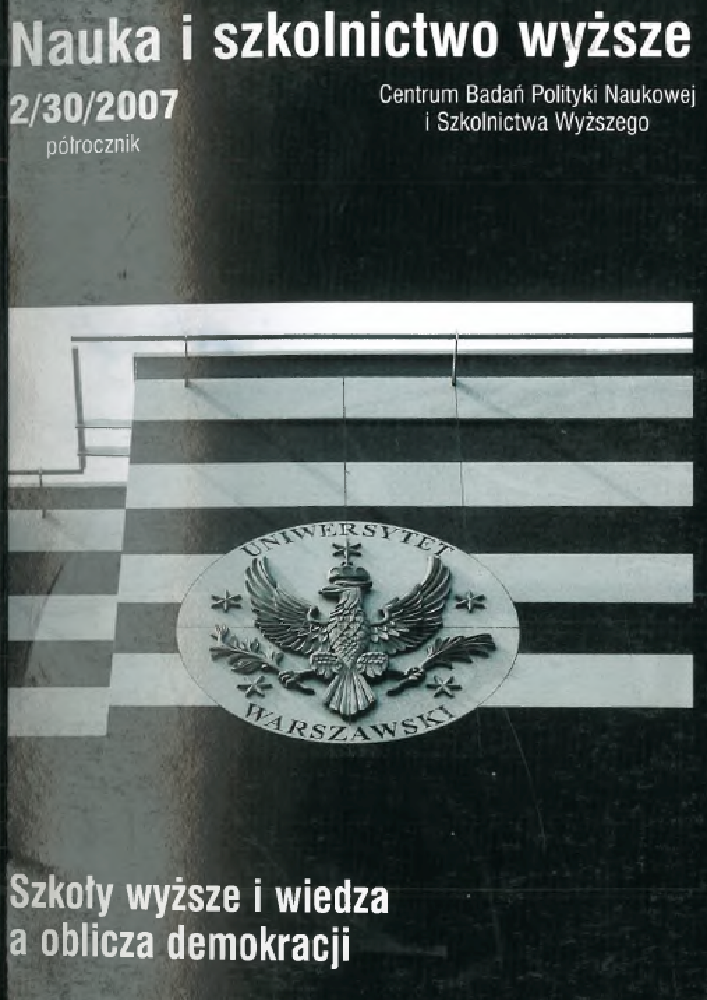Abstract
At present, the Bologna Declaration is the most important document for the academic community worldwide. This act, signed in 1999 by 29 European education ministers, lists goals that are expected to bring European education systems closer together. The implementation of the Declaration's objectives and their adoption in the development of tertiary education is known as the Bologna Process. The main goal of the Bologna document is to establish the European Higher Education Area by 2010. This noble goal is to be pursued by implementing transparent and comparable systems of research degrees, adopting an education system based on three cycles and common application of credits. Harmonisation of academic communities across Europe would not happen without efforts to promote student and teacher mobility or without joint European efforts to improve the quality of education. Eight years have passed since the Bologna Declaration was signed. The academic community has taken steps to pursue its objectives so it is interesting to see how far they have been put into practice at universities. This will help us to assess the mobilisation of the entire Bologna movement in extenso. Also, such analysis will identify areas where progress has been most significant and those where more effort is required. The arrangements developed by education ministers in Bologna in 1999 and during subsequent (cyclical) meetings in Berlin (2001), Prague (2003), Bergen (2005) and London (2007) should, or even must, be translated into practice. With this in view, the Author attempts to describe the actual progress towards implementation of the Bologna objectives as this considerably influences the development of Poland’s higher education. However, not all domestic universities seem to be sufficiently involved. In his discussion, the Author relies on findings from studies conducted in public and non-public schools of tertiary education in the Kujawsko-Pomorskie voivodship (one of Poland’s provinces). Recapitulation of those studies is likely to produce the real picture of progress towards the Bologna objectives in Poland’s higher education.
References
Bologna Process... 2007 Bologna Process Stocktaking Report 2007. Report from a Working Group Appointed by the Bologna Follow-up Group to the Ministerial Conference in London, May 2007 (http://www.dfes.gov.uk/bologna/index.cfm?fuseaction=content.view&CategorylD=23).
Berndt-Schreiber M. 2001 Regionalna Sieciowa Akademia Cisco na UMK. Współpraca z przemysłem na etapie nauczania, „Głos Uczelni” (Uniwersytet Mikołaja Kopernika w Toruniu), nr 10.
Kraśniewski A. 2006 Proces Boloński. Dokąd zmierza europejskie szkolnictwo wyższe?, Warszawa 2006.
Krause E. 2006 Proces Boloński w świadomości studentów uczelni publicznych i niepublicznych: między wiedzą a niewiedzą o szansach i możliwościach, w: W. Szymborski W. (red.): Stosunki międzynarodowe. Wybrane problemy, Uniwersytet Kazimierza Wielkiego, Bydgoszcz.
London... 2007 London Communique 2007. Towards the European Higher Education Area: Responding to Challenges in a Globalised World, May 2007 (http://www.dfes.gov.uk/bologna/index.cfm?fuseaction=content.view&Category ID=23).
Materiały... 2006 Materiały informacyjne. Kompleksowe doradztwo zawodowe dla studentów w programie Kompas, Uniwersytet Mikołaja Kopernika, Toruń.
